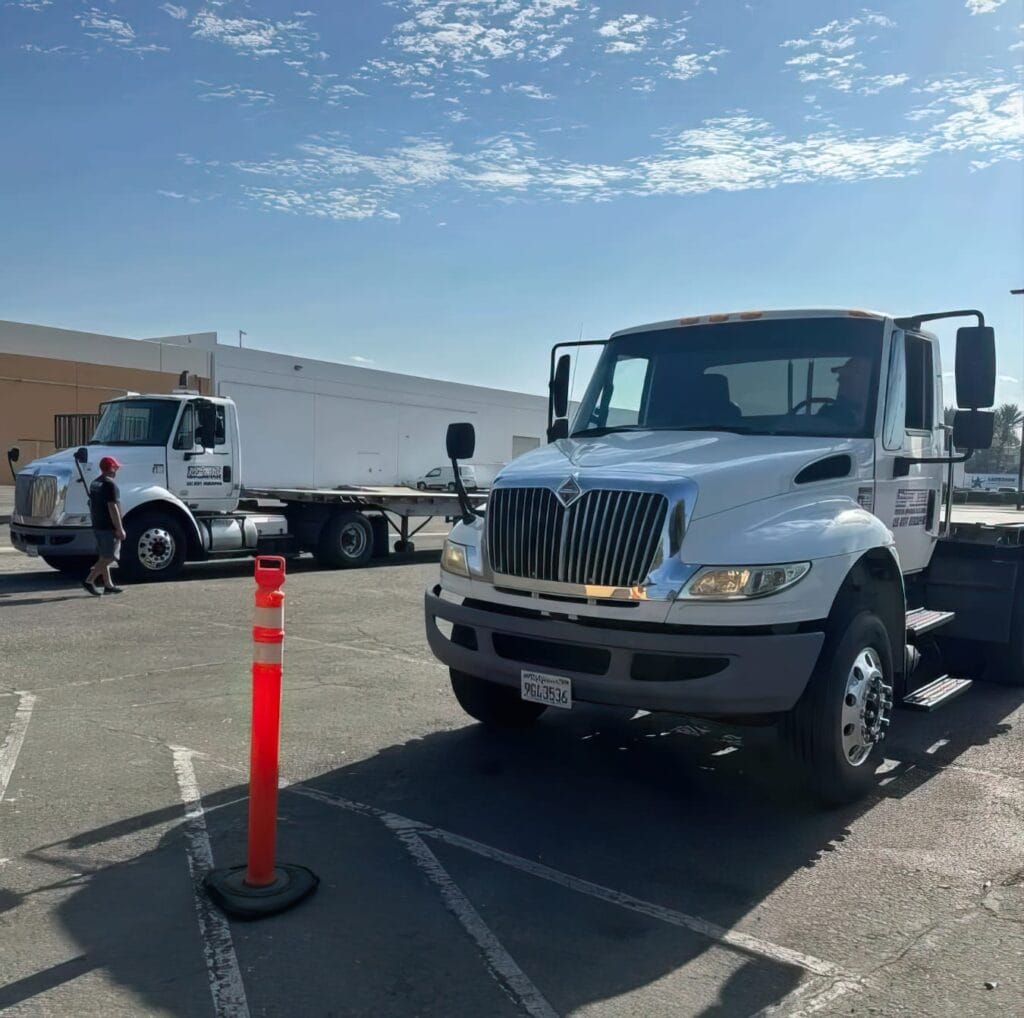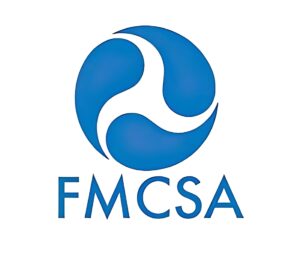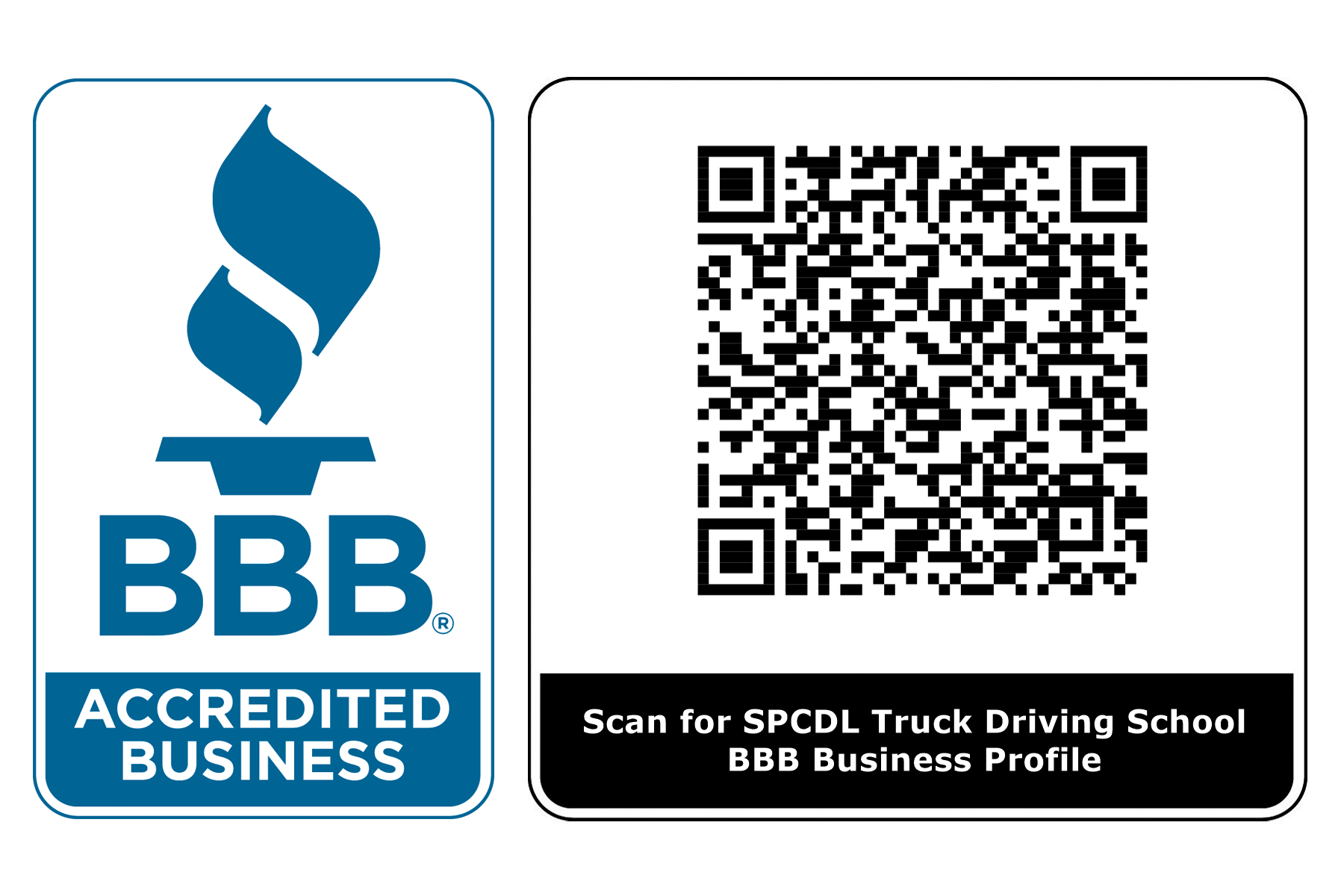FMCSA CDL Requirements
Staying Compliant with FMCSA CDL Guidelines
Staying compliant with FMCSA (Federal Motor Carrier Safety Administration) guidelines is essential for commercial motor vehicle (CMV) drivers. These rules ensure safety, maintain professional standards, and reduce risks on the road. If you’re a CDL holder or planning to become one, understanding FMCSA compliance will set you apart in the industry.
At SPCDL Truck Driving School®, we specialize in training drivers to meet and exceed FMCSA standards. Whether you’re a first-time student or a seasoned driver seeking advanced certifications, we’re here to guide you through every step of compliance.
What Are FMCSA CDL Requirements?
FMCSA guidelines are federal regulations governing commercial drivers and motor carriers. These FMCSA rules cover driver qualifications, vehicle maintenance, hours of service (HOS), and more.
Non-compliance can lead to severe consequences, including hefty fines, license suspension, and even disqualification from operating a CMV. That’s why FMCSA compliance is not just a requirement—it’s a career necessity.

Key Areas of FMCSA Compliance
1. Hours of Service (HOS) Regulations
Hours of Service rules are established to reduce the risk of accidents caused by driver fatigue. These regulations limit drivers to a maximum of 11 hours behind the wheel following a minimum of 10 consecutive hours off duty.
To ensure accurate tracking of these hours, the use of Electronic Logging Devices (ELDs) is required. These devices automatically record driving time, helping drivers and companies stay compliant with federal guidelines. These devices simplify compliance by automatically recording driving hours and rest periods.
At SPCDL Truck Driving School, we teach drivers how to use ELDs and manage their schedules effectively to remain compliant while maximizing efficiency.
2. Driver Qualifications
Commercial drivers must meet several qualifications, including:
- Holding a valid CDL appropriate for the vehicle class.
- Passing a medical exam to ensure fitness for operating a CMV.
- Meeting minimum age requirements (typically 21 for interstate driving).
SPCDL Advantage: We prepare you for every qualification requirement, from passing your CDL test to maintaining medical certifications.
3. Vehicle Maintenance and Inspections
Pre-trip, en route, and post-trip inspections are essential for ensuring vehicle safety. These checks identify issues like brake wear, tire pressure, and lighting failures before they become hazardous.
Compliance Tip: Drivers must maintain accurate inspection logs and address any issues promptly.
SPCDL’s Training: We emphasize hands-on training for two full days with your own certified truck driver who teaches you how to perform thorough inspections and document findings accurately.
Expanding on FMCSA Compliance
Drug and Alcohol Testing
FMCSA has a requirement that drivers must undergo drug and alcohol testing at various stages, including:
- Pre-employment prerequisite.
- Random intervals during employment.
- Post-accident.
Failing a test can lead to immediate suspension or disqualification.
SPCDL Guidance: We provide training on maintaining a clean record and understanding FMCSA’s drug and alcohol policies.
Hazmat Compliance and Endorsements
Transporting hazardous materials requires a Hazmat endorsement, which involves additional training and testing. FMCSA guidelines ensure the safe handling of potentially dangerous goods.
SPCDL’s Benefit to Our Students: Our Hazmat endorsement course helps drivers understand FMCSA regulations, pass their written tests, and secure high-paying Hazmat jobs.
FMCSA Safety Initiatives and Their Impact
FMCSA guidelines don’t just apply to drivers—they shape the entire trucking industry. Recent safety initiatives include stricter HOS regulations, enhanced drug testing protocols, and advanced vehicle technologies like collision avoidance systems.
These measures aim to reduce accidents and fatalities on the road, making compliance a shared responsibility between drivers and employers.
How SPCDL Prepares You for FMCSA Compliance
At SPCDL Truck Driving School, we offer a comprehensive curriculum that covers all aspects of FMCSA compliance.
Our Approach Includes:
- Hands-On Training: Personalized instruction for CDL skills like pre-trip inspections, defensive driving, and vehicle handling.
- ELD and Logbook Mastery: Learn how to use electronic and manual systems to maintain accurate records.
- Flexible Scheduling: Train at your own pace with online classes, then you receive two full days of dedicated driving sessions.
The Cost of Non-Compliance
Non-compliance can lead to significant financial and career consequences, including:
- Fines ranging from $1,000 to $10,000.
- License suspension or revocation.
- Higher insurance premiums for carriers.
Understanding these risks emphasizes the importance of choosing a school like SPCDL, where compliance training is a top priority.
State-Specific Compliance Rules
While FMCSA rules are federal, some states have additional requirements. For example, California enforces stricter emissions standards and cargo regulations.
SPCDL Focus: We tailor our training to meet both federal and state-specific guidelines, ensuring your readiness no matter where you work.
The Role of Pre-Trip Inspections in FMCSA Compliance
Pre-trip inspections are a critical component of FMCSA compliance, ensuring the safety and functionality of commercial motor vehicles before they hit the road. These inspections not only reduce the risk of accidents but also ensure drivers are operating within legal and professional standards.
For individuals pursuing a Class A CDL, Class B CDL, Class C, or Passenger Endorsement, mastering pre-trip inspections is non-negotiable. The FMCSA mandates that drivers inspect key components of their vehicles, such as brakes, tires, lights, and emergency systems, to identify and address any potential issues before starting their journey.
At SPCDL Truck Driving School, we prioritize pre-trip inspection training to prepare our students for success. With our hands-on, one-on-one instruction, you’ll learn how to:
- Conduct Thorough Inspections: Check all critical vehicle components for safety and functionality.
- Identify Common Issues: Spot potential hazards like worn brakes or underinflated tires.
- Meet FMCSA Standards: Ensure your inspections comply with federal and state requirements.
Pre-Trip Inspections for Class A CDL
For drivers pursuing a Class A CDL, pre-trip inspections are essential for safely operating large combination vehicles, such as tractor-trailers, flatbeds, and livestock carriers. These inspections are required by the FMCSA to ensure that vehicles meet safety standards and reduce the risk of accidents.
Key Areas of Focus for Class A CDL Pre-Trip Inspections:
- Coupling Systems: Ensure the fifth wheel, kingpin, and safety latches are secure and functioning properly.
- Trailer Inspection: Check brakes, lights, and reflective tape for proper operation, and ensure the trailer doors and hinges are in good condition.
- Tires and Suspension: Verify that tires are properly inflated and free of damage and inspect suspension components like springs and shocks.
At SPCDL Truck Driving School, our Class A CDL training program includes in-depth, hands-on instruction for conducting thorough pre-trip inspections. Our one-on-one training approach ensures students understand every step of the process, preparing them to pass their CDL skills test with confidence.
Pre-Trip Inspections for Class B CDL
For drivers seeking a Class B CDL, pre-trip inspections ensure the safety and reliability of single vehicles with a gross vehicle weight rating (GVWR) of 26,001 pounds or more. The most common vehicles in this category include; delivery trucks, dump trucks, and school buses.
Key Focus Areas for Class B Vehicles:
- Ensure brakes, lights, and mirrors are functioning correctly.
- Check tires, suspension, and fluid levels to avoid mechanical failures.
- Inspect emergency exits and passenger safety equipment (for vehicles carrying passengers).
Pre-Trip Inspections for Class C CDL
Drivers pursuing a Class C CDL often operate smaller commercial vehicles used for transporting passengers or hazardous materials. Pre-trip inspections are equally vital for ensuring these vehicles meet safety standards.
Key Focus Areas for Class C Vehicles:
- Verify the securement of passenger seating and accessibility equipment (if applicable).
- Inspect tires, brakes, and lights for proper functionality.
- Confirm the vehicle is free of leaks or defects, particularly when transporting sensitive cargo like medical supplies.
Pre-Trip Inspections for Passenger Endorsement
For drivers obtaining a Passenger Endorsement, pre-trip inspections have additional requirements to ensure the safety of passengers in buses or other commercial passenger vehicles. The FMCSA mandates these inspections to verify that vehicles can safely transport people in compliance with federal and state regulations.
Key Areas of Focus for Passenger Endorsement Pre-Trip Inspections:
- Passenger Safety Equipment: Check that emergency exits, fire extinguishers, and first aid kits are in place and functional.
- Seating and Accessibility: Ensure that passenger seats are secure and that wheelchair lifts or ramps (if applicable) are operational.
- Interior and Exterior Condition: Inspect the condition of the vehicle’s flooring, windows, mirrors, and lights to ensure a safe and comfortable ride.
SPCDL Truck Driving School specializes in training students for the Passenger Endorsement, providing the knowledge and practical skills required to conduct comprehensive pre-trip inspections. Our training ensures you’re prepared to meet FMCSA standards and deliver a safe, professional driving experience.
Pre-Trip Inspections for Hazmat Endorsement
When transporting hazardous materials, a comprehensive pre-trip inspection becomes even more critical due to the increased risks associated with these cargos. The FMCSA imposes stricter regulations for hazmat carriers, and failure to comply can result in severe penalties.
Key Focus Areas for Hazmat Transport:
- Inspect tank seals, valves, and cargo compartments for leaks or damage.
- Verify that placards and labels are correctly displayed and securely attached.
- Check that emergency response equipment (e.g., fire extinguishers, spill kits) is present and functional.
SPCDL Truck Driving School Prepares You for All CDL Types and Endorsements
At SPCDL, we customize our training to include pre-trip inspection techniques tailored to your CDL type or endorsement. Whether you’re pursuing a Class A, Class B, Class C, or adding a Hazmat Endorsement or Passenger Endorsement, you’ll gain the knowledge and skills needed to meet FMCSA standards confidently.
With SPCDL, you’ll learn:
- How to conduct thorough inspections specific to your vehicle type.
- The critical components required for CDL pre-trip test success.
- Best practices for maintaining compliance across all license classes and endorsements.
Whether you’re aiming to obtain your Class A, B, or C CDL or add a Passenger Endorsement to your license, our training equips you with the skills to perform pre-trip inspections confidently and efficiently.
By mastering pre-trip inspections, you not only enhance road safety but also boost your chances of passing the CDL skills test on your first attempt. Let SPCDL Truck Driving School guide you toward becoming a fully compliant and competent commercial driver.
FAQs About FMCSA Compliance for a CDL
1. What is FMCSA compliance?
FMCSA compliance involves adhering to federal regulations for commercial drivers and motor carriers, including HOS, drug testing, and vehicle inspections.
2. How does SPCDL help with compliance?
We offer comprehensive training on all FMCSA requirements, from ELD usage to Hazmat certifications.
3. Are FMCSA rules the same in every state?
FMCSA rules are federal, but states may impose additional requirements. SPCDL prepares you for both.
4. What happens if I fail to comply with FMCSA guidelines?
Penalties range from fines to license suspension. Non-compliance can also damage your professional reputation.
Why FMCSA Compliance Matters
Staying compliant isn’t just about avoiding penalties—it’s about building a successful and safe career. FMCSA rules create a standardized framework that protects drivers, carriers, and the public.
Choosing SPCDL Truck Driving School ensures you’re prepared to meet these standards. From Class A and B training to Hazmat endorsements, we offer everything you need to excel in the trucking industry.
Call to Sign Up with SPCDL Truck Driving School and Get on DMV’s Calendar Today
Ready to become a safe, compliant, and successful CDL driver? Enroll now at SPCDL Truck Driving School today!
📞 Call (909) 353-9897 to start your CDL school journey. Let us help you build a career that’s safe, profitable, and fully compliant with FMCSA guidelines.




